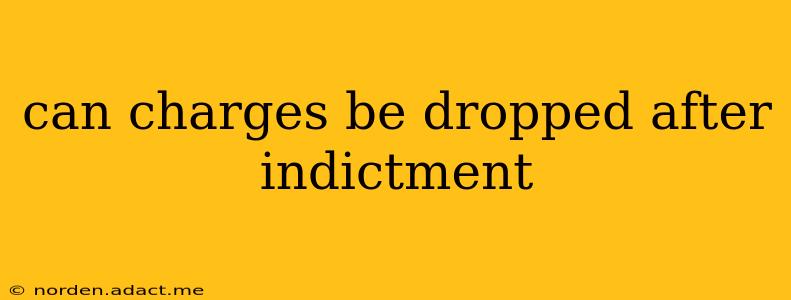An indictment, a formal accusation by a grand jury that there is enough evidence to bring criminal charges, marks a significant stage in a legal case. Many wonder: can charges be dropped after an indictment? The short answer is yes, but it's a complex process with various factors influencing the outcome. This article will delve into the reasons charges might be dropped post-indictment, the procedures involved, and what this means for the accused.
What Happens After an Indictment?
After an indictment, the defendant is formally arraigned, where they're informed of the charges and enter a plea (guilty, not guilty, or no contest). The case then proceeds through the various stages of the legal process, including discovery (exchanging evidence), pre-trial motions, and potentially, a trial.
Reasons Charges Can Be Dropped After Indictment
Several reasons can lead to charges being dropped even after an indictment. These include:
-
Insufficient Evidence: This is perhaps the most common reason. Even after indictment, the prosecution might discover new evidence that weakens their case or reveals significant flaws. This could lead them to believe that conviction is unlikely, prompting them to drop the charges to avoid a costly and time-consuming trial.
-
Witness Reluctance or Unreliability: Key witnesses may become unavailable, change their testimonies, or prove unreliable, rendering their testimony inadmissible or unhelpful to the prosecution's case. This lack of credible witness accounts can lead to a dismissal.
-
Negotiated Plea Bargain: The prosecution might offer the defendant a plea bargain, where they plead guilty to a lesser charge in exchange for the dismissal of the original, more serious indictment. This is a common strategy that saves time and resources for both parties.
-
Errors in the Indictment: Sometimes, legal errors or procedural irregularities in the indictment itself might lead to its dismissal. This could involve issues with the wording, the presentation of evidence to the grand jury, or other procedural mistakes.
-
Prosecutorial Discretion: Prosecutors have the discretion to dismiss charges even if they believe there's enough evidence for conviction. Factors such as the strength of the evidence, available resources, the overall impact on the justice system, and other case priorities may influence their decision. This is particularly relevant in cases where the prosecutor might re-evaluate the case's merits or public interest.
How Are Charges Dropped After an Indictment?
Charges aren't simply dropped casually. The prosecution typically needs to file a motion to dismiss with the court, outlining the reasons for the dismissal. The judge will then review the motion and decide whether to grant it. This process often involves legal arguments and hearings.
What Does it Mean When Charges Are Dropped After an Indictment?
When charges are dropped after an indictment, the indictment is dismissed, and the case is essentially closed. The defendant is no longer facing criminal charges related to that specific indictment. However, it’s crucial to understand that:
- The charges can be refiled: The prosecution retains the right to refile charges later if new evidence emerges.
- The dismissal doesn't erase the event: Even with the charges dropped, the underlying events that led to the indictment still remain a matter of public record. It might impact future employment, background checks, or other aspects of life.
- Legal representation remains important: Seeking legal counsel remains crucial even after the charges are dropped, especially to navigate any potential repercussions of the case.
Can charges be dropped after indictment if I'm innocent?
Yes, even if you are innocent, charges can be dropped after an indictment. The reasons mentioned above – insufficient evidence, unreliable witnesses, etc. – can apply regardless of the defendant's actual guilt or innocence. An indictment is not a determination of guilt. It simply means enough evidence exists to proceed to trial.
What are the chances of charges being dropped after an indictment?
The chances of charges being dropped after an indictment vary greatly depending on the specific circumstances of the case, the evidence available, the jurisdiction, and the prosecutor's discretion. There is no single answer to this question.
How long does it take for charges to be dropped after an indictment?
The timeframe for charges being dropped after an indictment can range from a few weeks to many months, or even years, depending on the complexity of the case and the legal proceedings involved.
Navigating the legal system after an indictment is complex and challenging. This information is for educational purposes only and should not be construed as legal advice. Anyone facing criminal charges should seek the counsel of a qualified attorney.
